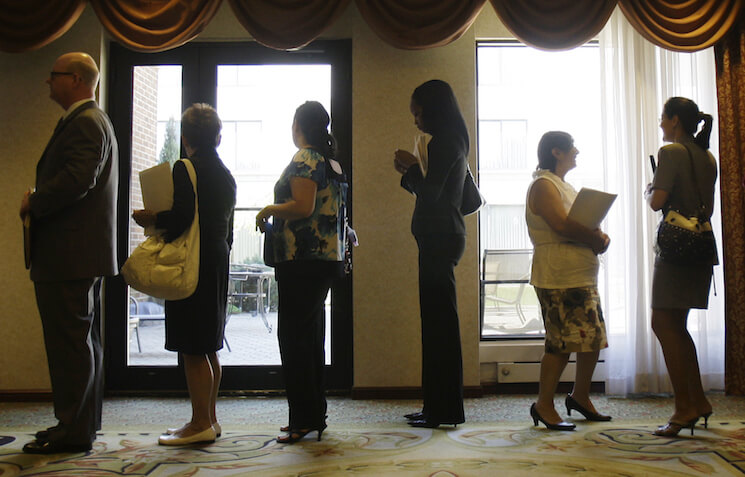Why less job searching can be a good thing

Prior to the Great Recession of 2007-2009, eligible unemployed workers in the United States could receive unemployment insurance checks for up to 26 weeks. In the wake of the recession and the massive damage done to the labor market, however, the nation’s unemployment insurance program was extended so that workers could collect up to 99 weeks of benefits. Supporting workers when they can’t find a job makes sense, but some economists and policymakers were concerned that extending the program actually increased the amount of unemployment as workers searched less for a job. While workers on unemployment insurance did search less intensely during the recession, this reduction helped some unemployed workers find jobs.
There’s a wide body of research on the effect of unemployment insurance on the unemployment rate—and the vast majority of this research finds that unemployment insurance actually does increase the unemployment rate a small amount. But it’s important to note how it increases unemployment. By having some cash to allow them to take longer to find a job, workers will continue to show up as unemployed in the calculations of the unemployment rate. If they couldn’t find a job and stopped looking for work, they wouldn’t show up as unemployed according to the technical definition of unemployment. So by keeping workers in the job hunt, the unemployment insurance program pushes up the unemployment rate. It also allows workers to search less intensely and for a longer time, which increases the unemployment rate as well.
Just looking at how this program affects the individual worker’s unemployment status, however, is what economists might call a “partial equilibrium” analysis. In other words, the analysis hasn’t gone the next step to see how the micro-level change for each worker affects the macro level, or “general equilibrium.” Looking at the extension of unemployment insurance benefits in general equilibrium might show that the effect on unemployment is larger or smaller than looking just at the micro level.
A paper by University of Chicago economist Ioana Marinescu looks at just that question. (Here’s a summary of Marinescu’s paper at VoxEU.) Using data from the online job board CareerBuilder.com, Marinescu looks at how the extension of unemployment insurance affected total unemployment. She found that extended benefits reduced the intensity of job searching, measured by the number of job applications, but that the number of job openings posted didn’t change much. The result: less competition for the available jobs, increasing the probability that an unemployed worker could get a job.
The extended unemployment insurance benefits, in essence, tightened the labor market. The program, by inducing some workers to search less, made it seem like there were fewer unemployed workers and made the overall labor market seem more like one during an economic expansion. The macro effect of the extended benefits reduces the impact of the micro effect on the overall unemployment rate. According to Marinescu’s results, a 10 percent increase in the duration of unemployment insurance benefits only increased total unemployment by 0.6 percent. Including the macro effects pushes down the effect of unemployment insurance on unemployment by 40 percent.
While this result is a good reminder to not look at the effect of a program in isolation, it’s also further proof that helping unemployed workers during downturns isn’t just something that feels good—it’s something that has some real economic logic behind it.
